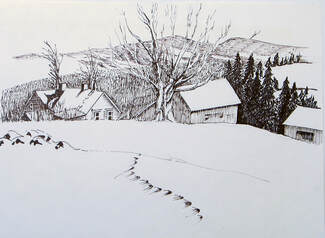 ©Alice Whitney ©Alice Whitney We found this one in the annals, and thought it fitting for the season. It was originally published in January of '87, and we have edited slightly for colour. Enjoy! O wad some Pow’r the giftie gie us To see oursels as ithers see us! – quote from To a Louse by Robert Burns Every once in a while, one gets a fleeting glimpse of oneself in the mirror of someone else’s words and it was so for me the other day. I was talking with someone in Saint John with whom I have done business for a number of years. When the business has concluded, we often move off into other universes of discourse and have a good chin-wag about anything under the sun that happens to interest us at the moment. Often the talk has to do with religion – he is a member of one church, I of another – but the other day the talk turned in the direction of the cold weather and heating systems. My friend also lives in the country, not too far south of Fredericton, and must drive into Saint John every day to go to work. I know that there are those who make the drive down and back, day after day, through the winter. I myself used to drive to Sackville – and back – once a week through the winter, the prospect of having to make such a trip daily, no matter how foul the weather, seems daunting, to say the least.
But the driving doesn’t seem to bother my friend, nor, as far as I can tell, does he think of his life as being in peril as he embarks on his journey. As we talked of the winter and its chilliness the talk came ‘round to heating systems and I admitted we didn’t have a heating “system.” My friend, who probably earns as much in one month as I do in an entire year, has a country home pretty well filled with what the British are wont to call “mod cons,” short for “modern conveniences.” Among the mod cons is a furnace in the basement and radiators throughout the house, all controlled by a little thermostat on the wall. If the temperature outside drops suddenly the thermostat knows about it and orders up more heat to keep everything inside on an even keel. All my life, I guess, I have lived in houses with what is called “central heating.” Like my friend, I have always assumed that there was no other way to survive the chilly winter months. Always, that is, until we moved to this farm house. When we first arrived there was cold water available at the kitchen sink, a big Enterprise wood stove in the kitchen, and an oil space heater in the front of the house. That, and a rudimentary electrical system was the extent of the “mod cons.” Much around here has changed in the years since we first came down here from the city a thousand miles distant, and every bit as distant in mind set. I look ruefully at the electrical panel with its rows of circuits and remember the two fifteen-amp circuits that sufficed when we first came. But in one regard we have moved away from the modern world. We heat entirely with wood stoves – the cookstove in the kitchen, a Jotul box stove in the dining room and another box stove in the living room. It has become second nature to reach for a stick of wood if the wind gets up and the thermometer drops. From the time when autumn begins to be a bit crisp around the edges and continuing until well after the peepers begin peeping in the spring, the fire in one or more of the stoves is always burning, and the piles of wood in the woodshed melt away in the cold as the snow will melt away in the warmth of the spring. It reminds me of the old saying “Half your wood and half your hay, you should have on Candelmas Day.” We have learned some things that the central-heating salesmen never tell you. For example, we have learned that heat in the downstairs will make its way upstairs without any aid from fans or pumps. We have learned that on a cold morning the floors upstairs are warm, even though the downstairs is cold and the stoves may only hold a few coals; and there is more warmth upstairs than down. That, it seems to me, is where you want to have some warmth first thing, to ease the always-traumatic transition from sleep to waking. I caught a glimpse of the way “others see us” in my friend’s rather carefully phrased question, as I explained that we heated with wood stoves: “I suppose some mornings the temperature would be below sixty downstairs?” And I had to admit that, yes, some mornings the temperature in the kitchen, when I come down, is distinctly below sixty. I thought I sensed a shiver at the other end of the line. The conversation ended shortly thereafter and ever since I have been thinking of things I should have said. There is something right and fitting to knowing how the season has changed. Maybe, as we grow older, we will put in some sort of central heating. For the time being, though, we meet Old Man Winter on his own ground and treat him with respect, as a force to be reckoned with, not just as a nuisance to be overcome with the twist of a thermostat dial. |
Words & ImagesWe moved to our farm in Sussex, New Brunswick from Toronto in 1977, only moving away in 2014. Archives
April 2020
Categories
All
|
